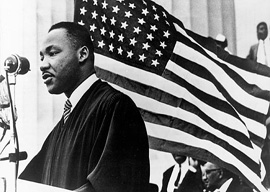
January 17, 2013

Martin Luther King Jr.
The left’s wailing about gun control should have been over at least two weeks ago, but Alex Jones’s erratic interview with Piers Morgan provided enough fuel to keep the anti-gun flames stoked for many weeks into the future.
I recently chronicled the sporadic blame game that arose in Sandy Hook’s wake as well as the glorious backlash after a newspaper began publishing gun owners” home addresses. Tracking the entire media debate, I didn”t see a single exchange perceived worse than Alex Jones’s.
But I didn”t see too many that were remarkably better, either. Even More Guns, Less Crime author John Lott, who has published very detailed work on firearms policy, seemed sorely underprepared during his CNN segment in December. His facts were spot-on, but his timid and scrappy presentation hindered their strength.
On Friday, CNN aired what came to be my favorite interview of all. “Gun Appreciation Day” chairman Larry Ward used the race card against its own fanatics. Co-panelist Maria Roach, a black woman, gave a sigh of contempt when Ward dared to speak of Martin Luther King, Jr., as an ally of the Second Amendment. She seemed unaware that King personally applied for a concealed-carry permit after his house was bombed in 1956. The government denied his application, so he hired armed guards for protection instead.
Ward explained:
I think Martin Luther King, Jr. would agree with me if he were alive today that if African Americans had been given the right to keep and bear arms from day one of the country’s founding, perhaps slavery might not have been a chapter in our history.
The New York Times published an op-ed lambasting Ward’s assertion without saying why. The Daily Beast also tried to critique the interview but ended up admitting that rebellions often failed because slaves were up against “their far better-armed masters.” In other words, the slaves” guns were controlled. The sole objective of early gun prohibition was to ensure the slaves couldn”t fight back.
In 1644, more than a century before the Constitution’s ratification, Virginia introduced a law forbidding freed blacks from owning firearms. Throughout the next decade, uprisings weren”t commonplace”it’s difficult to revolt without guns”but they occasionally happened. So Virginian plantation owners lobbied the government to enact further restrictions on the slaves” right to self-defense. In 1680, the state issued a new piece of legislation, “An act for preventing Negroes Insurrections,” to restrain blacks from purchasing any weapons that may have loosened their shackles: